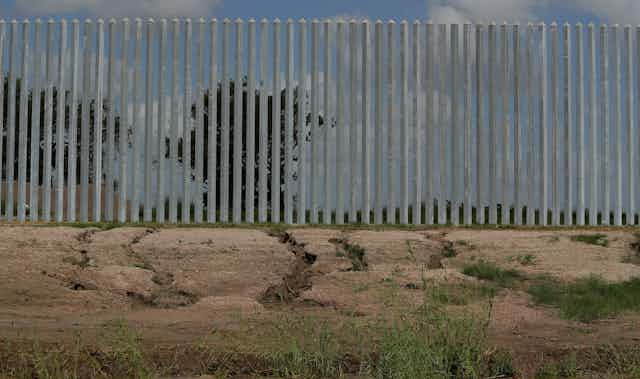The COVID-19 pandemic can teach us many things about how climate change emergencies manifest themselves, and how humanitarian organizations can think and do things differently.
COVID-19 is itself linked to some of the same issues as human-influenced climate change. The outbreak in humans of any zoonotic virus, as SARS-CoV-2 is, goes immediately to the poisonous way in which humans interact with the natural world — habitat loss pushing wild animals closer to human settlement, remote mining and road-building putting more people into what were once wilderness areas, industrialized meat production introducing viruses into the food supply, and so on.
Read more: Coronavirus is a wake-up call: our war with the environment is leading to pandemics
Some of the worst peaks of the pandemic have reportedly not been in the Global South but in the north, in rich societies that were ostensibly better prepared for a pandemic but that have become unused to facing crises and so struggle to cope with them. Likewise, the humanitarian consequences of climate change will dominate the lives of all countries, in all parts of the world.
We’re not all in it together
Despite the pandemic’s global impact, any illusion that facing a common viral enemy might bring us together lasted a short second. As with all crises, COVID-19’s case numbers and mortality rates have tracked the fissures of racism, class and gender.
For example, Black Americans are dying of COVID-19 at more than twice the rate of white Americans, as reportedly are Indigenous peoples in Brazil. Climate change impacts show a similar inequality in which emerging crises disproportionately affect communities made vulnerable by longstanding, unaddressed disadvantages.

COVID-19 has found multilateralism incapable of delivering on its promise of co-operation between states to overcome global-level threats beyond the capacity of any one nation-state to handle. Three examples from many: the Trump administration’s decision to withdraw from the World Health Organization, the scramble for personal protective equipment including export restrictions and even charges of state piracy, and the political race to secure COVID-19 vaccines.
Comparable points apply to international co-operation on climate change. In the short term, the next-stage climate negotiations (COP26) have been delayed a year, as have international negotiations such as the Convention on Biological Diversity and the High Seas Treaty. In the longer term, the accommodations granted to polluting-industry lobbies and allied states will only add to the challenges of international negotiations.
Read more: How a global ocean treaty could protect biodiversity in the high seas
The instinctive response by states to the pandemic has been the opposite of co-operation: the hardening of bordering regimes. In early July 2020, 91 per cent of the world’s population lived in countries with heightened border restrictions. And refugees, migrants and asylum seekers have been stigmatized and targeted, including in Greece, Malaysia, South Africa, Mexico and many other countries. A similarly repressive instinct, even the closure of external borders altogether, is reality for people fleeing the effects of climate change.
Extractivism — the only thing immune?
One industry that seemingly is unaffected by the shutdowns is mining. Extractive industries have turned the pandemic into a boom time, continuing operations by gaining “essential” status, lobbying successfully for weakened environmental regulations and allying with police and armed actors to repress environmental and Indigenous protests to this.
Canada has systematically used the COVID-19 crisis to curb environmental protections for communities and ecosystems in Canada and beyond. It is not a coincidence that extractive industries and supporting governments are the key antagonists in preventing action against climate change and in trampling on the rights of Indigenous peoples and other marginalized communities.

Trust, denial, elite panic and lifeboats
Some of the worst outbreaks have occurred in countries where political leaders have sought to downplay and deny the COVID-19 pandemic — most obviously in Brazil and the United States, but also in others, such as Nicaragua, Turkmenistan and Tanzania.
COVID-19 denialism is grounded in the same techniques, the same amplifiers and funders, and the same intent as climate-change denialism. Rather than save the whole sinking ship, a panicked elite seeks to jettison those it does not value. This is “the politics of the armed lifeboat”:
There is a real risk that strong states with developed economies will succumb to a politics of xenophobia, racism, police repression, surveillance and militarism and thus transform themselves into fortress societies while the rest of the world slips into collapse. By that course, developed economies would turn into neofascist islands of relative stability in a sea of chaos. … [But] A world in climatological collapse — marked by hunger, disease, criminality, fanaticism and violent social breakdown — will overwhelm the armed lifeboat. Eventually, all will sink in the same morass.
Dismantling the ‘armed lifeboat’
The act of providing life-saving assistance and protection to the victims and survivors of emergencies and crises has its own value. But humanitarians need to do much more than simply bandaging the violence embedded in pandemics and in climate change.

The act of moving across borders to escape the effects of an emergency should be understood as more than a mere act of survival — but rather as an important step in decolonization. The same with the protest actions of people who oppose discriminatory, exclusionary and violent policies.
COVID-19 and the health impacts of climate change are closely intertwined with centuries of colonialism, extractive capitalism and racism. And so, a humanitarian response will only hold meaning as truly human, when and if the related histories of harm and acts of contestation are listened to, learned from and are leading the way.
It requires doing things radically differently. Doing otherwise.
This article was co-authored by Sean Healy, head of reflection and analysis at Médecins Sans Frontières - Operational Centre, Amsterdam.

